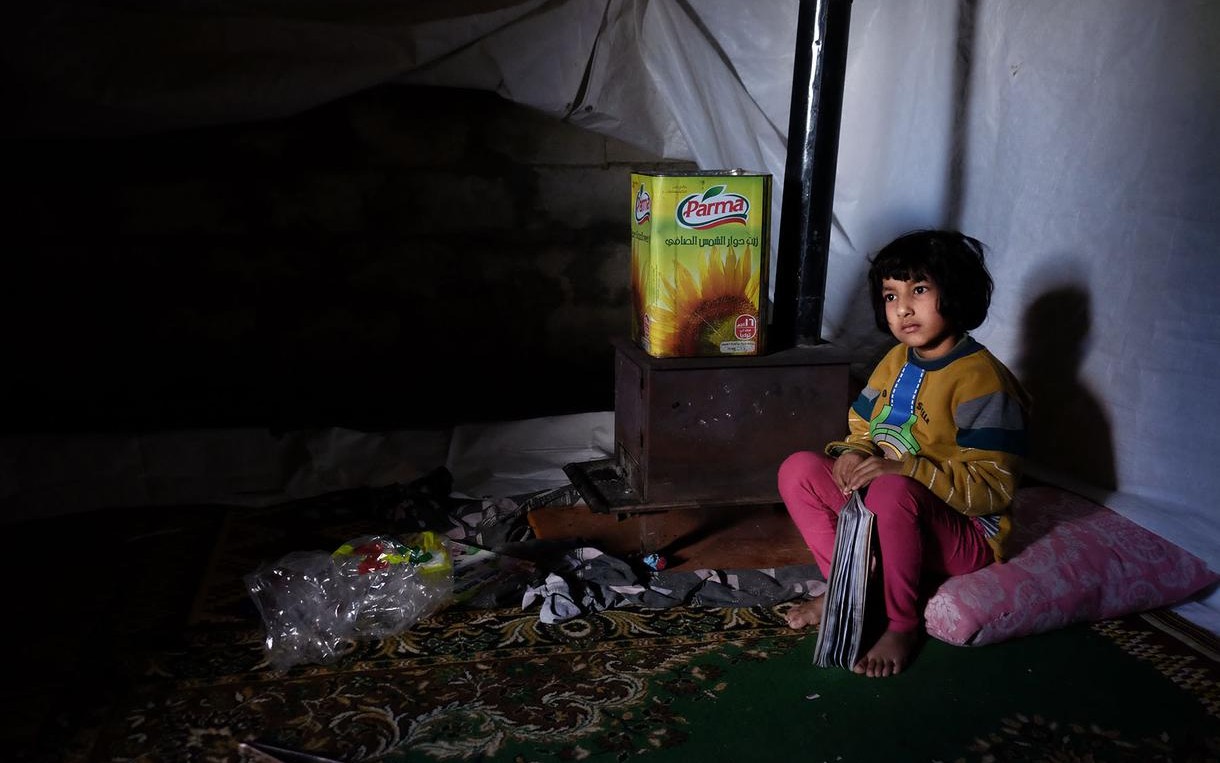Why Syrian refugees need our help to weather the storm
 Six-year-old Raneem in her family's shelter in northern Lebanon. During the storm, the water leaked through the walls and the window in the tent where she lives with her parents and brothers. They had to move to another tent. Photo: Oriol Andres/Oxfam
Six-year-old Raneem in her family's shelter in northern Lebanon. During the storm, the water leaked through the walls and the window in the tent where she lives with her parents and brothers. They had to move to another tent. Photo: Oriol Andres/Oxfam
Winter weather is challenging for everyone. Now imagine trying to survive it without heat—or even a roof over your head.
Like most Americans, I’ve found the wintry weather affecting much of the country right now pretty unpleasant. Here in DC, political pundits were preoccupied with the snowfall’s impact on the swearing in of the new Congress, Metro commuters have been tweeting about major service delays, and cyclists like me have had to deal with treacherously icy bike lanes and slushy spray from passing cars.
When I start to complain too much, though, I think of what’s happening in the Middle East, where a massive snow storm has brought more than inconvenience for millions of Syrians who are suffering through their fourth winter since the start of their country’s brutal civil war.
Inside Syria, people are burning furniture and anything else they can get their hands on to keep warm. In Lebanon, four people have died as a result of the storm, and heavy snowfall has blocked access to markets and hospitals and collapsed thousands of the makeshift tents that most Syrians call home. Oxfam and other aid agencies are helping refugees to rebuild their damaged and demolished homes, digging trenches to prevent flood water from causing even more damage, and providing refugees with cash to buy essential supplies to help them weather the storms.
Around this time last year, I was in Lebanon’s Bekaa Valley talking with refugees. They told me that in winter the temporary employment that many relied on to feed their families dried up. Without a source of income and with the savings they brought from Syria dwindling, heating fuel was too expensive for many refugees to afford. Those living in tents and other makeshift structures suffered the most, as many had little more than the light jackets they carried with them when they fled. In addition to colds and the flu, the winter months also bring an increase in diarrheal diseases, as refugees are often unable to wash their hands when water tanks freeze.
While the winter brings additional hardships to refugees, the challenges they face are not insurmountable. In one community I visited, for example, Oxfam had helped refugees to build reinforced tents on an elevated patch of earth surrounded by rich farmland. Each tent contained a heating stove in the center, and a communal water tank provided clean drinking water for the residents. A generous Lebanese landlord had allowed the refugees to stay for free on his farm, and even hooked up their homes to his electricity supply so they wouldn’t have to fear using the communal latrines that Oxfam had built in the evenings. When I visited, the children were off in school.
Just down the road, however, I came across a group of refugees living in a situation that couldn’t be more different. A local landowner was charging several Syrian families nearly 100 dollars a month each to live in one of his old concrete chicken coops. A roof was not included in the price; they had to buy their own metal sheet to cover their new home.
As I stood talking to an older Syrian man, a group of children were playing tag in the mud in front of their home. Some of them had enrolled in the local school when they arrived in Lebanon, he told me, but the teacher treated the Syrian children more harshly and other students taunted and threw stones at them until they dropped out. Newer arrivals didn’t even bother registering, just a few of the millions of Syrian refugee children not attending school. As we spoke, a bitterly cold rain began to fall. When I asked why nobody went inside, one of the women explained that the roof had so many leaks they might as well stand outside.
A year has passed since I met those Syrians in Lebanon, and since then hundreds of thousands more families have been forced to flee their homes. Today, one in every four people living in Lebanon is a Syrian refugee. Perhaps worst of all, with peace talks stalled, there is little hope amongst Syrian refugees we work with that much will change for the better before the next unforgiving winter arrives. As the conflict drags on, and even the most generous host communities are being stretched to their limit, countries in the region are announcing new restrictions aimed at controlling the number of Syrian refugees.
As we bundle up this winter, we must do more to help Syrians—both refugees and those who remain in their country—weather the storms they are facing. This means providing more support to help them live safely and in dignity, as well as increased access to asylum in the US and other countries outside the region. And we must press our leaders to recommit to the difficult but essential task of restarting the stalled peace process to find an end to Syria’s civil war.
Oxfam has helped more than 1.5 million people across Syria, Lebanon, and Jordan with lifesaving essentials. But the needs of families remain enormous. Donate now.